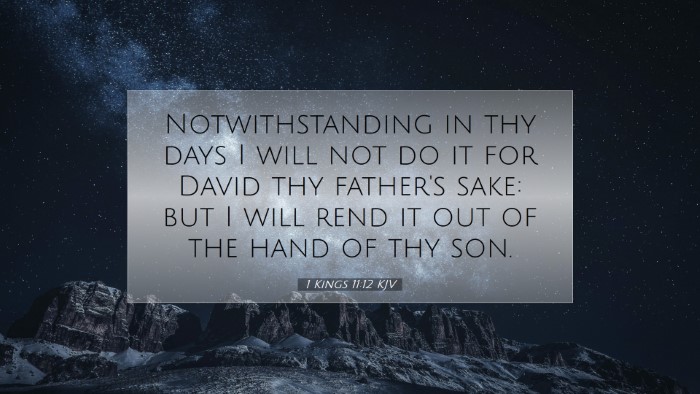Commentary on 1 Kings 11:12
1 Kings 11:12 states, "Notwithstanding in your days I will not do it for David your father's sake: but I will rend it out of the hand of your son." This verse is nestled in a broader narrative concerning the consequences of King Solomon's idolatry and the ensuing division of the kingdom of Israel. Here, we will explore insights from notable public domain commentaries to deepen our understanding of this significant scripture.
Historical Context
The events of 1 Kings unfold during a pivotal time in Israel's history when Solomon's reign is marked by prosperity but also moral decline. This decline is articulated through his relationships with foreign women and the ensuing idolatrous practices that compromised Israel's covenant with God.
Divine Judgment and Mercy
The Lord's message to Solomon delineates a harsh reality: the repercussions of disobedience include the division of the kingdom. However, in His grace and covenantal loyalty, God postpones this judgment until the reign of Solomon's son, Rehoboam.
Matthew Henry's Insights
-
God’s Patience: Henry emphasizes the patience of God, indicating that despite Solomon’s failings, God delays immediate judgment for the sake of David.
-
Davidic Covenant: Henry underscores the significance of the Davidic covenant, arguing that God's faithfulness to David shields Solomon temporarily from dire consequences.
-
Impact on Succession: The verse suggests a theological principle that the actions of one generation can influence another. Solomon's son will inherit the fallout of his father's decisions, highlighting the principle of corporate responsibility.
Albert Barnes' Analysis
-
Judgment Delayed: Barnes notes that God's decision to delay the tearing of the kingdom is a testament to His mercy. He points out that God values the legacy of righteous leaders like David, offering a testament to God's favor extended beyond the immediate.
-
Consequences of Idolatry: Barnes draws attention to the broader consequence of forsaking God; he elaborates that turning away results in division and conflict. This division foreshadows the turbulent history that Israel will endure.
-
Manifestation of God’s Sovereignty: The manner in which God orchestrates the future of Israel reflects His sovereignty. Barnes illustrates that while human actions carry weight, there remains an overarching divine plan, assuring that God remains on His throne regardless of human failure.
Adam Clarke's Exegesis
-
Transition to Judgment: Clarke explicates the phrase "I will rend it out of the hand of your son," emphasizing the gravity of impending judgment. He provides a vivid rendering of how such division would be a direct act of divine redirection.
-
Generational Consequences: Similar to his contemporaries, Clarke highlights the theme of generational consequences, positing that the moral decay of one generation produces a chasm for the next, urging students of Scripture to consider their spiritual legacy.
-
Symbol of Hope: Despite the ominous forecast, Clarke reveals a glimmer of hope in the mention of David. This hope serves as a reminder that even in moments of judgment, God’s covenant remains intact, preserving a remnant of faithfulness.
Theological Implications
The multifaceted interpretations of 1 Kings 11:12 bring to light essential theological implications:
-
Covenant Theology: The protective grace God affords Solomon due to David's legacy encourages a deeper understanding of covenant faithfulness and its implications across generations.
-
Sovereignty and Free Will: The dynamic interplay between human choices and divine sovereignty invites scholars to pursue a robust discourse on human agency in relation to God’s overarching purposes.
-
Judgment and Mercy: The verse poignantly juxtaposes judgment with mercy, reminding readers that God’s justice is tempered by His eternal covenant and mercy for those who honor Him.
Application for Contemporary Readers
For modern pastors, students, and theologians, the lessons embedded within this verse challenge the faithful to reflect deeply on their life choices and the impacts they may have on future generations. The delay of judgment reminds believers that God often operates within a timeline that serves His sovereign purposes, urging patience, repentance, and a commitment to righteousness that transcends personal experience.
Additionally, this scripture invites a profound meditation on the nature of God’s mercy. As we ponder the implications of covenant faithfulness through history, we are prompted to assess how we, like Solomon, might affect the spiritual trajectory of our families and communities through our choices.
Conclusion
In summary, the commentary on 1 Kings 11:12 serves not only as a historical and theological exploration of God’s dealings with humanity but as a profound exhortation for the faithful to embrace the weight of their spiritual legacy. Through the insights of Matthew Henry, Albert Barnes, and Adam Clarke, we are reminded that while the consequences of folly are severe, the grace of God, tethered to His everlasting covenants, extends an invitation to mercy and reflects the enduring hope woven into the narrative of our faith.


